Beloved Maggi noodles the focus of food scare in India

An Indian man prepares Nestle Maggi instant noodles at his roadside food stall on the outskirts of New Delhi.
- Share via
reporting from Mumbai, India — India’s capital on Wednesday banned the sale of a beloved instant noodle after tests determined that samples of the product contained higher than legal levels of lead.
New Delhi joined more than a dozen Indian states that have either recalled or ordered tests in recent days on Maggi noodles, a popular brand manufactured by the Swiss conglomerate Nestle, after samples were shown to contain high amounts of lead as well as monosodium glutamate, or MSG, an additive not listed on its packaging.
The Delhi government asked asked Nestle to withdraw all Maggi noodles from stores in the capital within 15 days, the Press Trust of India reported. At least four additional states – Punjab in the north and Andhra Pradesh, Tamil Nadu and Telangana in the south – ordered the testing of samples.
Although there were no immediate reports of Indians falling ill after consuming the product, many stores were pulling the familiar red-and-yellow packages off their shelves as a preemptive measure. India’s largest retailer, Future Group, said it had temporarily withdrawn the product “in the interest of consumer sentiment.”
Billions of Maggi packets are sold every year in more than 100 countries, but perhaps nowhere are they cherished more than in India, where the piping-hot, ready-in-two-minutes noodles are a comfort food that spans generations and regions.
“We call it the third staple of India. There’s rice, wheat and Maggi,” said Kiran Khalap, co-founder of Chlorophyll, a brand consultancy.
“It’s something that children have grown up with, students have grown up with and bachelors, especially, have grown up with. To suddenly have this news, it’s like a very trusted and close friend betraying you.”
Nestle, which had sales of $1.5 billion in India last year, as much as one-fifth of which analysts say were Maggi noodles, has said its own lab tests have shown the product to be “safe to eat,” with lead levels within permissible limits.
Under Indian laws, the maximum amount of lead allowed in food products is 2.5 parts per million. Tests on Maggi samples from the northern state of Uttar Pradesh in April found the lead content to be nearly seven times higher.
Indian food safety regulations also prohibit MSG – a flavor enhancer that has been linked to health issues in pregnant women and newborns – to be added to certain products, including dry pasta and noodles.
Authorities in the western states of Maharashtra and Goa said Wednesday that they had not detected high lead levels in Maggi samples brought for testing. In Mumbai, Maharashtra’s capital, shopkeepers said the noodles were still selling but worried about future sales.
Kiran Ghosnani, who runs a corner shop in the middle-class Mahim section of Mumbai, said he would not order more Maggi noodles until additional tests determined the product to be safe.
“Business-wise, it would be risky to ask for more stock,” Ghosnani said.
The news has fallen like a weight on many Indians, who associate Maggi noodles variously with college dorms, childhood treats, sick days and homebound afternoons during the annual monsoon rains. To adapt to changing tastes, the brand in recent years has introduced new flavors of spice packs and wheat noodles that appeal to increasingly health-conscious Indians.
“I did not expect this from a brand like Maggi,” said Suhas Kavthekar, a 63-year-old retired bank worker in Mumbai.
When his sons were in elementary school, they and the other children in the apartment block would want Maggi noodles after playing in the neighborhood, he recalled. The kids would buy Maggi packets on their way home from school, mimicking the brand’s familiar jingle.
“Playing in the colony and then pouncing on Maggi was a ritual for these kids,” Kavthekar said. “And we parents shared it with our kids. It was a means to bond with them, to eat Maggi together on the same plate.
“It was a shock to hear those stories about them and I will definitely not eat them now.”
The elevated lead levels were discovered by state health inspectors, a victory for a young food safety regime widely seen to be ill-equipped to handle an ever-growing roster of eateries and ready-made foods in the country of 1.2 billion.
The previous major food safety scare in India, in 2006 -- when Coca-Cola and Pepsi soft drinks were found to contain pesticides -- was prompted by a report by the Center for Science and the Environment, a think tank.
“The very fact that a state implementing agency has found this is good and we welcome it,” said Amit Khurana, head of the center’s food safety program.
“In this case, the laws were in place. There is still a lot of scope for improvement in monitoring at the state level.”
Parth M.N. is a special correspondent.
For more news from South Asia, follow @SBengali on Twitter
More to Read
Sign up for Essential California
The most important California stories and recommendations in your inbox every morning.
You may occasionally receive promotional content from the Los Angeles Times.











